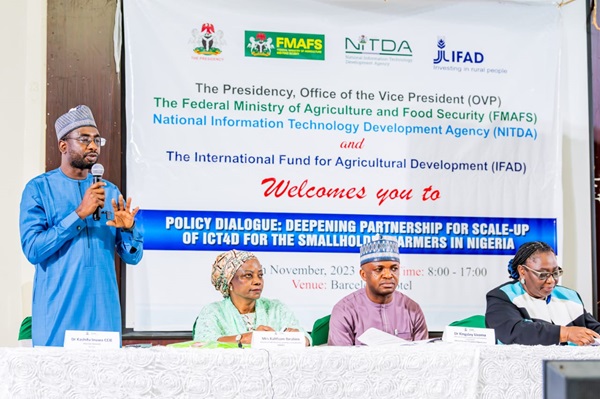
In a bid to rejuvenate Nigeria’s agricultural sector, the Director General of the National Information Technology Development Agency (NITDA), Kashifu Abdullahi, emphasised the pivotal role of digitising processes for smallholder farmers.
The goal is not only to boost productivity but also to propel the country’s gross domestic product (GDP) by an estimated $67 billion. Smallholder farmers presently contribute about 90 per cent of the nation’s food production and constitute 21 per cent of its $477 billion GDP.
Addressing a policy dialogue session in collaboration with the Office of the Presidency, the Ministry of Agriculture & Food Security and the International Fund for Agricultural Development (IFAD) at the Barcelona Hotel in Abuja,Abdullahi highlighted the significance of the initiative. The theme of the session, “Deepening Partnership for Scale-up of Information & Communications Technology for Development (ICT4D) for Smallholder Farmers in Nigeria,” underscores the need for collaboration among relevant stakeholders to implement solutions that enhance productivity.
In his opening remarks,Abdullahi conveyed that the policy dialogue aligns with President Bola Ahmed Tinubu’s agenda to diversify the economy through the digital transformation of critical sectors. “President Bola Ahmed Tinubu is committed to uplifting Nigeria through digital transformation, innovation, and economic growth,” he stated. The President has mandated the Ministry of Communications, Innovation and Digital Economy to accelerate economic diversification by leveraging technological innovation.
Highlighting the agricultural sector’s paramount importance, Abdullahi emphasised that it contributes approximately 70 per cent to businesses in Africa and constitutes 21 per cent of Nigeria’s GDP. He stressed the need for prioritising technology penetration in this sector, citing the Netherlands as a case study. Despite Nigeria’s land size being almost 22 times larger than the Netherlands, the latter excels as the second-largest agricultural producer globally due to its effective use of technology.
In line with the presidential mandate, Abdullahi discussed NITDA’s collaboration with the Federal Ministry of Agriculture in formulating the National Digital Agricultural Strategy. This strategy gave rise to the development of the National Adopted Village for Smart Agriculture, implemented in six states in collaboration with various institutions, including academia, fintech and telecom companies. The platform created serves as a marketplace, connecting participants with financial institutions, and features a controlled wallet to ensure proper fund utilisation.
Expressing optimism, Abdullahi asserted, “I believe that with this kind of partnership, we can scale up that platform and make agri-business a fancy business for our youth to be part of it”.
During her welcome address, the country director of the IFAD country office, Abuja, Mrs. Dede Ekoue, expressed gratitude to the NITDA DG for his commitment to deploying high-quality technical expertise for digital solutions in agriculture. She invited stakeholders from various sectors to discuss approaches to strengthen partnerships and digital solutions for smallholder farmers globally and in Nigeria.
In his remarks, the special senior assistant to the president on agribusiness and productivity enhancement, Dr. Kingsley Uzoma commended DG NITDA for active participation in various policy developments. He emphasized the importance of sustained efforts in digital literacy in partnership with key agencies and the private sector to ensure greater technology absorption by smallholder farmers, leading to improved productivity, technical upscaling, best practices and increased trade.
Uzoma also advocated for a centrally coordinated agricultural data hub to aggregate and provide insights on open and targeted data relevant to planning, policy direction, and essential decision-making. He concluded by stressing the need for increased collaboration with the Federal Ministry of Agriculture & Food Security and NITDA to implement a national digital dialogue strategy, further leveraging technology for advancements in the agricultural sector.


